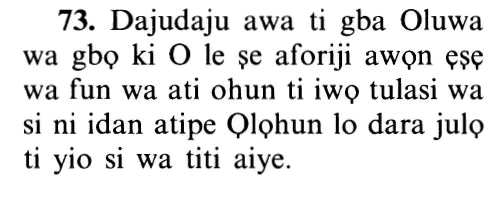20vs73
Select any filter and click on Go! to see results
إِنَّا آمَنَّا بِرَبِّنَا لِيَغْفِرَ لَنَا خَطَايَانَا وَمَا أَكْرَهْتَنَا عَلَيْهِ مِنَ السِّحْرِ وَاللَّهُ خَيْرٌ وَأَبْقَى
Inna amanna birabbina liyaghfira lana khatayana wama akrahtana AAalayhi mina alssihri waAllahu khayrun waabqa
Index Terms
Click to play
Yoruba Translation

Hausa Translation
"Lalle mũ, mun yi ĩmãni da Ubangijinmu dõmin Ya gãfarta mana laifuffukanmu da abin da ka tĩlasta mu a kansa na sihiri. Kuma Allah ne Mafi alhħri, kumaMafi wanzuwa."
Asbabu n-Nuzuul (Occasions of Revelation)
إِنَّا آمَنَّا بِرَبِّنَا لِيَغْفِرَ لَنَا خَطَايَانَا ...
Verily, we have believed in our Lord, that He may forgive us our faults,
"Whatever evils that we did.''
It specifically means, `which we were forced to do of magic, in order to oppose the sign of Allah and the miracle of His Prophet.'
Ibn Abi Hatim recorded that Ibn Abbas said concerning Allah's statement, وَمَا أَكْرَهْتَنَا عَلَيْهِ مِنَ السِّحْرِ (and the magic to which you compelled us),
"Fir`awn took forty boys from the Children of Israel and commanded that they be taught magic at Al-Farama. He said, `Teach them knowledge that no one in the land knows.'''
Ibn Abbas then said,
"They were of those who believed in Musa and they were of those who said,
آمَنَّا بِرَبِّنَا لِيَغْفِرَ لَنَا خَطَايَانَا وَمَا أَكْرَهْتَنَا عَلَيْهِ مِنَ السِّحْرِ...
We have believed in our Lord, that He may forgive us our faults, and the magic to which you did compel us.''
Abdur-Rahman bin Zayd bin Aslam said the same.
Allah's statement,
... وَاللَّهُ خَيْرٌ وَأَبْقَى ﴿٧٣﴾
And Allah is better as regards reward in comparison to your reward, and more lasting.
means, "He is better for us than you.''
وَأَبْقَى (and more lasting), More lasting in reward than what you promised us and made us aspire to.
It is apparent that Fir`awn (may Allah curse him) was bent upon their punishment, and that what he did to them was a mercy from Allah for them. This is why Ibn Abbas and others of the Salaf said,
"They woke up in that morning as magicians, but they became witnesses of faith by the evening.''
" إنا آمنا بربنا ليغفر لنا خطايانا " أي ما كان منا من الآثام خصوصا ما أكرهتنا عليه من السحر لتعارض به آية الله تعالى ومعجزة نبيه. وقال ابن أبي حاتم حدثنا أبي حدثنا نعيم بن حماد حدثنا سفيان بن عيينة عن أبي سعيد عن عكرمة عن ابن عباس في قوله تعالى وما أكرهتنا عليه من السحر قال أخذ فرعون أربعين غلاما من بني إسرائيل فأمر أن يعلموا السحر بالفرماء وقال علموهم تعليما لا يعلمه أحد في الأرض قال ابن عباس فهم من الذين آمنوا بموسى وهم من الذين قالوا آمنا بربنا ليغفر لنا خطايانا وما أكرهتنا عليه من السحر وكذا قال عبد الرحمن بن زيد بن أسلم وقوله " والله خير وأبقى " أي خير لنا منك وأبقى أي أدوم ثوابا مما كنت وعدتنا ومنيتنا وهو رواية عن ابن إسحاق رحمه الله وقال محمد بن كعب القرظي والله خير أي لنا منك إن أطيع وأبقى أي منك عذابا إن عصي وروي نحوه عن ابن إسحاق أيضا والظاهر أن فرعون لعنه الله صمم على ذلك وفعله بهم رحمة لهم من الله ولهذا قال ابن عباس وغيره من السلف أصبحوا سحرة وأمسوا شهداء .
"إنا آمنا بربنا ليغفر لنا خطايانا" من الإشراك وغيره "وما أكرهتنا عليه من السحر" تعلما وعملا لمعارضة موسى "والله خير" منك ثوابا إذا أطيع "وأبقى" منك عذابا إذا عصي
أي صدقنا بالله وحده لا شريك له وما جاءنا به موسى .
I'raab - grammatical analysis of the Qur'an
«إِنَّا» إن واسمها «آمَنَّا» ماض وفاعله والجملة خبر إن «بِرَبِّنا» متعلقان بآمنا ونا مضاف إليه «لِيَغْفِرَ» اللام للتعليل والفعل المضارع منصوب بأن المضمرة بعد لام التعليل والفاعل مستتر وأن وما بعدها في محل جر باللام وهما متعلقان بآمنا «لَنا» متعلقان بيغفر «خَطايانا» مفعول به منصوب ونا في محل جر مضاف إليه «وَ» الواو عاطفة «ما» اسم موصول في محل نصب معطوف على خطايانا «أَكْرَهْتَنا» ماض وفاعله ومفعوله «عَلَيْهِ» متعلقان بأكرهتنا والجملة لا محل لها لأنها صلة «مِنَ السِّحْرِ» متعلقان بمحذوف حال «وَاللَّهُ خَيْرٌ» الواو عاطفة والمبتدأ والخبر جملة معطوفة «وَأَبْقى » معطوف على خير بالرفع
